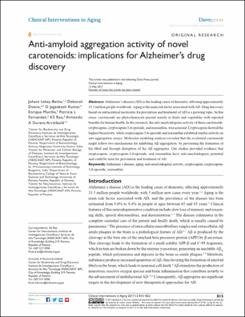Mostrar el registro sencillo del ítem
Anti-amyloid aggregation activity of novel carotenoids: implications for Alzheimer’s drug discovery
| dc.contributor.author | Lakey-Beitia, Johant | |
| dc.contributor.author | Doens, Deborah | |
| dc.contributor.author | Kumar, D Jagadeesh | |
| dc.contributor.author | Murillo, Enrique | |
| dc.contributor.author | L Fernandez, Patricia | |
| dc.contributor.author | Rao, KS Jagannatha | |
| dc.contributor.author | Durant-Archibold, Armando A | |
| dc.date.accessioned | 2020-06-25T02:26:41Z | |
| dc.date.available | 2020-06-25T02:26:41Z | |
| dc.date.issued | 2017-05-15 | |
| dc.identifier.other | 10.2147/CIA.S134605 | |
| dc.identifier.uri | http://repositorio-indicasat.org.pa/handle/123456789/112 | |
| dc.description | Alzheimer’s disease (AD) is the leading cause of dementia, affecting approximately 33.5 million people worldwide. Aging is the main risk factor associated with AD. Drug discovery based on nutraceutical molecules for prevention and treatment of AD is a growing topic. In this sense, carotenoids are phytochemicals present mainly in fruits and vegetables with reported benefits for human health. In this research, the anti-amyloidogenic activity of three carotenoids, cryptocapsin, cryptocapsin-5,6-epoxide, and zeaxanthin, was assessed. Cryptocapsin showed the highest bioactivity, while cryptocapsin-5,6-epoxide and zeaxanthin exhibited similar activity on anti-aggregation assays. Molecular modeling analysis revealed that the evaluated carotenoids might follow two mechanisms for inhibiting Aβ aggregation: by preventing the formation of the fibril and through disruption of the Aβ aggregates. Our studies provided evidence that cryptocapsin, cryptocapsin-5,6-epoxide, and zeaxanthin have anti-amyloidogenic potential and could be used for prevention and treatment of AD. | en_US |
| dc.description.abstract | Alzheimer’s disease (AD) is the leading cause of dementia, affecting approximately 33.5 million people worldwide. Aging is the main risk factor associated with AD. Drug discovery based on nutraceutical molecules for prevention and treatment of AD is a growing topic. In this sense, carotenoids are phytochemicals present mainly in fruits and vegetables with reported benefits for human health. In this research, the anti-amyloidogenic activity of three carotenoids, cryptocapsin, cryptocapsin-5,6-epoxide, and zeaxanthin, was assessed. Cryptocapsin showed the highest bioactivity, while cryptocapsin-5,6-epoxide and zeaxanthin exhibited similar activity on anti-aggregation assays. Molecular modeling analysis revealed that the evaluated carotenoids might follow two mechanisms for inhibiting Aβ aggregation: by preventing the formation of the fibril and through disruption of the Aβ aggregates. Our studies provided evidence that cryptocapsin, cryptocapsin-5,6-epoxide, and zeaxanthin have anti-amyloidogenic potential and could be used for prevention and treatment of AD. | en_US |
| dc.language.iso | en | en_US |
| dc.subject | Alzheimer’s disease | en_US |
| dc.subject | aging | en_US |
| dc.subject | anti-amyloidogenic activity | en_US |
| dc.subject | cryptocapsin | en_US |
| dc.subject | cryptocapsin-5 | en_US |
| dc.subject | 6-epoxide | en_US |
| dc.subject | zeaxanthin | en_US |
| dc.title | Anti-amyloid aggregation activity of novel carotenoids: implications for Alzheimer’s drug discovery | en_US |
| dc.type | Article | en_US |

